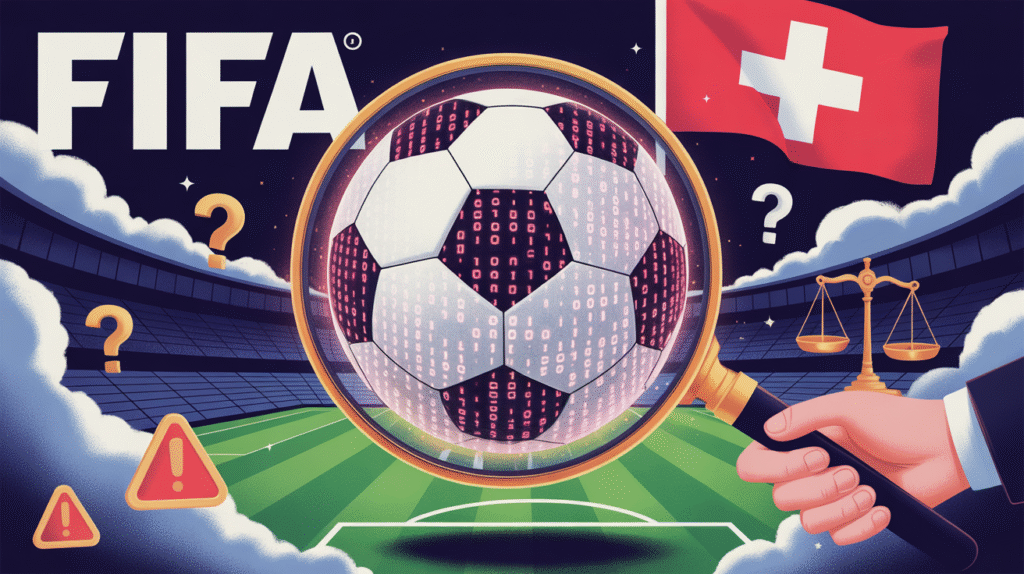Switzerland’s gambling regulator has initiated a fact-finding probe into FIFA – its blockchain “Right-to-Buy” token scheme over concerns that it may conceal elements of gambling. The move threatens to derail FIFA’s bold push into Web3 ticketing, and could have ripple effects across the crypto, sports, and entertainment industries.
What’s under investigation?
In 2024, FIFA created “RTB tokens” (Right-to-Buy tokens) as part of an innovative ticketing plan for the World Cup 2026. The idea was to allow fans to hold tokens that, if their national team qualified, would give them the option, but not the guarantee of purchasing match tickets. In recent months, FIFA has sold around $15 million worth of these tokens.
However, the Swiss gambling authority, known as Gespa, is now scrutinizing whether the structure of this product might run afoul of Swiss gambling laws.
While the inquiry remains preliminary, it has already raised alarm in both crypto and sports circles. Though no formal complaints have been filed, Gespa believes the model’s design alone warrants investigation.
The Token Model: Innovation or Hidden Betting?
The RTB tokens blend features of NFTs, speculative trading, and conditional rewards. If your country qualifies, your token gives you priority access to purchase World Cup tickets. If your team does not qualify, the token holds little practical value beyond being a collectible that might trade in secondary markets.
Critics argue that the system resembles a lottery or bet on team performance. Some analysts warn that most token holders will end up with digital assets of negligible worth. As crypto analyst Marc Steiner told SwissInfo, the model “introduces speculative behavior under the guise of digital fandom,” and the “loss ratio could exceed 80% if most teams fail to qualify.”
Additional red flags include:
-
No guaranteed return: Buyers receive no assured payout or successful ticket rights; all depends on team qualification.
-
Opaque odds: The platform lacks clear disclosures about chances or expected values.
-
Price discrimination by teams: Tokens for stronger or more popular national teams command higher prices, suggesting market speculation.
-
Volatile secondary market: Token trading may magnify price swings and speculative excesses akin to gambling markets.
Supporters of the scheme counter that RTB tokens are not bets, but rather engagement tools designed to deepen fan loyalty. They contend the tokens offer collectibility, tradability, and optionality, not wagering.
Still, the blurred boundary between betting and speculative community utility draws uneasy comparisons. If regulators find the token model does constitute gambling, FIFA could face sanctions, forced suspension of sales, or restrictions on access from Swiss domains.
Why Switzerland? Why Now?
Switzerland maintains a strict regulatory regime for both land-based and online gambling. Gespa routinely enforces laws around lotteries, betting, and games of chance. Because FIFA’s scheme is new and untested, the authorities view it with caution.
Should Gespa classify RTB tokens as a form of gambling, enforcement measures may follow. These could include blocking sales, domain bans, or fines on operators.
Moreover, regulatory decisions in Switzerland often influence other jurisdictions. Legal observers anticipate that authorities in the European Union, the United States, or other nations may adopt similar stances, especially if Switzerland sets a precedent.
Stakes Are High for FIFA’s Web3 Ambitions
FIFA has publicly embraced blockchain, NFTs, and the “metaverse” as key touchpoints for fan engagement at the 2026 World Cup. The RTB token project serves as a flagship experiment in digital ticketing, intended to modernize and gamify fan access.
Yet this gamble carries risk. Though $15 million is a fraction of FIFA’s projected $11 billion revenue for the tournament, it is still meaningful in the context of blockchain and crypto ventures. The controversy may damage brand perception, especially if critics tie the program to unregulated gambling.
Crypto commentators also warn that this case could become a cautionary tale. If FIFA’s token model draws negative regulatory rulings, it may dissuade other event organizers, sports franchises, or entertainment platforms from exploring Web3 ticketing. Many in the blockchain world fear a stigma could attach to NFT ticket systems seen as gambling in disguise.
Executives at crypto and NFT platforms are watching closely. The outcome of Gespa’s investigation could shift compliance standards, risk models, and legal frameworks across ticketing, collectible drops, and Web3 engagement in sports, music, arts and beyond.
What Happens Next?
At present, the probe remains in its fact-finding phase. Gespa has not yet announced enforcement measures or definitive legal findings. FIFA has not publicly responded to the inquiry, beyond continuing to operate the token platform.
But in coming weeks and months, several developments are possible:
-
Regulatory ruling or guidelines – Gespa may clarify whether RTB tokens fall under gambling law.
-
Operational adjustments or pauses – FIFA might temporarily suspend sales or adjust token mechanics to reduce legal risk.
-
Broader crackdowns – Other nations may pursue similar investigations into crypto ticketing or conditional NFT systems.
-
Industry shifts – Event organizers and blockchain projects may adopt more conservative tokenization models or avoid conditional, performance-based rewards.
The underlying question is whether speculation can masquerade as fandom indefinitely, or whether regulators will draw a line between collectible innovation and gambling. FIFA’s RTB tokens currently dance on that boundary.
The coming weeks will be crucial not just for FIFA, but for the broader evolution of blockchain in sports, entertainment, and fan engagement. Regulators, crypto firms, and fans will be watching closely to see whether innovation triumphs or gets reined in by legal scrutiny.




